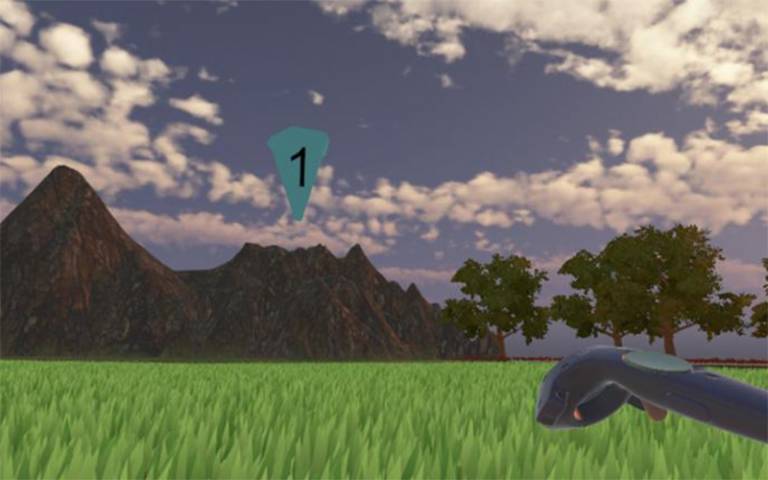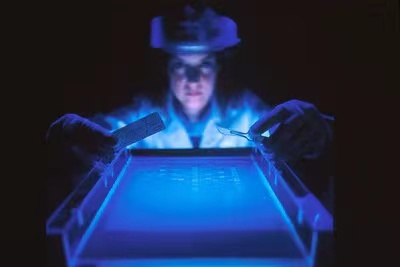创新背景
很多研究表明,早在任何症状变得明显之前,阿尔茨海默病就开始发展了,但很难检测到这样的变化。
创新过程
2014年,约翰·奥基夫教授(伦敦大学学院细胞与发育生物学,塞恩斯伯里威康中心主任)因“发现了构成大脑定位系统的细胞”而共同获得诺贝尔生理学或医学奖。从本质上说,这意味着大脑包含了一个精神的“卫星导航”,可以知道我们在哪里,我们去过哪里,以及如何找到我们周围的路。这种内部卫星导航系统的一个关键组成部分是大脑的内嗅皮层。这是阿尔茨海默病中最先受损的区域之一,这或许可以解释为什么“迷路”是这种疾病的首批症状之一。然而,用于临床诊断的纸笔认知测试无法测试导航困难。

伦敦大学学院(UCL)和剑桥大学(Cambridge)的一组研究人员现在在有患痴呆症风险的患者身上开发并试验了VR导航测试。在测试中,患者戴上VR头戴设备,在模拟环境中行走时进行导航测试。成功地完成这项任务需要完整的内嗅皮层功能,因此研究团队假设,早期阿尔茨海默病患者在测试中会受到不成比例的影响。
研究小组从剑桥大学医院NHS信托轻度认知障碍和记忆诊所招募了45名轻度认知障碍(MCI)患者。轻度认知障碍(MCI)患者通常表现出记忆障碍,但虽然轻度认知障碍可能预示着早期阿尔茨海默病,但它也可能是由焦虑甚至正常衰老等其他状况引起的。因此,确定轻度认知障碍的病因对于确定受影响的个体未来是否有患痴呆症的风险至关重要。
研究人员采集了脑脊液(CSF)样本,以寻找MCI患者潜在阿尔茨海默病的生物标志物,其中12例检测呈阳性。研究人员还招募了41名与年龄匹配的健康对照组进行比较。

所有轻度认知障碍患者在导航任务上的表现都比健康对照组差。然而,这项研究得出了两个至关重要的额外观察结果。首先,脑脊液标记阳性的MCI患者——表明阿尔茨海默病的存在,从而使他们有罹患痴呆症的风险——比那些脑脊液标记阴性、未来罹患痴呆症风险较低的患者表现更差。
其次,VR导航任务在区分这些低风险和高风险轻度认知障碍患者方面比目前使用的一系列被认为是诊断早期阿尔茨海默病的黄金标准的测试要好。
虚拟现实技术还可以帮助未来药物的临床试验,这些药物旨在减缓甚至停止阿尔茨海默病的发展。在动物模型和人类参与者之间缺乏记忆测试的可比性是目前临床试验的一个主要问题。
在啮齿类动物和人类中,支撑导航的脑细胞是相似的,所以测试导航可能会使人克服阿尔茨海默病药物试验的障碍,并帮助将基础科学发现转化为临床应用。
创新价值
导航的VR测试可能比我们目前在临床和研究中使用的测试更好地识别早期阿尔茨海默病。
创新关键点
虚拟现实测试可能是早期识别阿尔茨海默病的一种有价值的方法,并为研究认知能力提供了一个强大的工具。
创新主体
伦敦大学学院(University College London,简称:UCL ),1826年创立于英国伦敦,是一所公立研究型大学,为伦敦大学联盟的创校学院、罗素大学集团和欧洲研究型大学联盟创始成员,被誉为金三角名校和“G5超级精英大学”之一。
UCL是伦敦的第一所大学,以其多元的学科设置著称,于REF 2014 英国大学官方排名中,位列全英之冠,享有最多的科研经费。UCL的医学、解剖学和生理学、建筑学、教育学、考古学、计算机科学、计算金融学等学科排名均位居世界前列,与LSE并称为“英国现代经济学研究的双子星”;其人文学院颁发的奥威尔奖则是政治写作界的最高荣誉。
Using virtual reality technology to discover navigation problems in early Alzheimer's disease
In 2014, Professor John O 'Keefe (Director of the Sainsbury Wellcome Centre for Cell and Developmental Biology, University College London) shared the Nobel Prize in Physiology or Medicine for "the discovery of cells that make up the positioning system of the brain". Essentially, this means that the brain contains a mental "satnav" that knows where we are, where we've been, and how to find our way around. A key component of this internal satellite navigation system is the entorhinal cortex of the brain. This is one of the first areas to be damaged in Alzheimer's disease, which may explain why "getting lost" is one of the first symptoms of the disease. However, pen-and-paper cognitive tests used for clinical diagnosis cannot test for navigational difficulties.
A team of researchers at UCL and Cambridge have now developed and trialled VR navigation tests on patients at risk of developing dementia. In the test, patients wear a VR headset and conduct navigation tests while walking in a simulated environment. Successfully performing this task requires full entorhinal cortex function, so the research team hypothesized that patients with early Alzheimer's would be disproportionately affected in the test.
The team recruited 45 patients with mild cognitive impairment (MCI) from the Mild Cognitive Impairment and Memory Clinic at Cambridge University Hospitals NHS Trust. People with mild cognitive impairment (MCI) often exhibit memory impairment, but while MCI may indicate early Alzheimer's disease, it can also be caused by other conditions such as anxiety or even normal aging. Therefore, determining the etiology of MCI is essential to determine whether affected individuals are at risk of developing dementia in the future.
Cerebrospinal fluid (CSF) samples were taken to look for biomarkers of potential Alzheimer's disease in MCI patients, 12 of whom tested positive. The researchers also recruited 41 healthy, age-matched controls for comparison.
All MCI patients performed worse on the navigation task than healthy controls. However, the study makes two additional observations that are crucial. First, MCI patients with positive CSF markers - indicating the presence of Alzheimer's disease and thus putting them at risk for dementia - performed worse than those with negative CSF markers and a lower risk of future dementia.
Second, the VR navigation task was better at distinguishing between these low-risk and high-risk MCI patients than a series of tests currently in use that are considered the gold standard for diagnosing early-stage Alzheimer's disease.
Vr technology could also aid clinical trials of future drugs aimed at slowing or even stopping the progression of Alzheimer's disease. The lack of comparability of memory tests between animal models and human participants is a major problem in current clinical trials.
The brain cells that underpin navigation are similar in rodents and humans, so testing navigation may allow one to overcome the obstacles of Alzheimer's drug trials and help translate basic scientific findings into clinical applications.
智能推荐
肿瘤学创新 | 新型磁疗法可增强乳腺癌的治疗效果
2022-09-30开创新型磁疗法增强对乳腺癌的治疗作用,优化磁性方案,更有效地杀死癌细胞,从而推动癌症治疗发展。
涉及学科涉及领域研究方向肿瘤学创新 | 创新开发新型“拭子测试”可提前预测宫颈细胞癌变
2022-10-27研究人员开发了一种新的拭子测试,可以提前四年识别预测宫颈细胞的癌变。
涉及学科涉及领域研究方向AI+医学影像 | 利用AI检测多发性硬化症患者的脑成像变化
2022-08-08伦敦大学学院和伦敦国王学院的研究人员开发了一种新的基于人工智能的方法,用于检测大脑对多发性硬化症(MS)治疗的反应。
涉及学科涉及领域研究方向肿瘤治疗学创新 | 创新开发“单细胞RNA测序”技术确定多发性骨髓瘤治疗靶点
2022-11-23利用样本中的数万个细胞确定被认为是MM癌前阶段的极少数恶性细胞,为 MM 和癌前状态创建更好的预测模型和诊断标志物,确定有吸引力的治疗靶点CD84。
涉及学科涉及领域研究方向